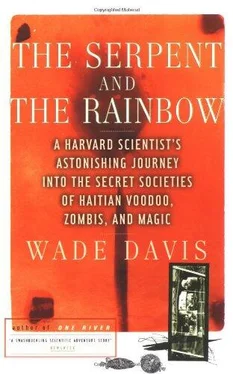Wade Davis - The Serpent and the Rainbow
Здесь есть возможность читать онлайн «Wade Davis - The Serpent and the Rainbow» весь текст электронной книги совершенно бесплатно (целиком полную версию без сокращений). В некоторых случаях можно слушать аудио, скачать через торрент в формате fb2 и присутствует краткое содержание. Год выпуска: 1985, Издательство: Simon & Schuster, Жанр: Старинная литература, на английском языке. Описание произведения, (предисловие) а так же отзывы посетителей доступны на портале библиотеки ЛибКат.
- Название:The Serpent and the Rainbow
- Автор:
- Издательство:Simon & Schuster
- Жанр:
- Год:1985
- ISBN:нет данных
- Рейтинг книги:5 / 5. Голосов: 1
-
Избранное:Добавить в избранное
- Отзывы:
-
Ваша оценка:
- 100
- 1
- 2
- 3
- 4
- 5
The Serpent and the Rainbow: краткое содержание, описание и аннотация
Предлагаем к чтению аннотацию, описание, краткое содержание или предисловие (зависит от того, что написал сам автор книги «The Serpent and the Rainbow»). Если вы не нашли необходимую информацию о книге — напишите в комментариях, мы постараемся отыскать её.
The Serpent and the Rainbow — читать онлайн бесплатно полную книгу (весь текст) целиком
Ниже представлен текст книги, разбитый по страницам. Система сохранения места последней прочитанной страницы, позволяет с удобством читать онлайн бесплатно книгу «The Serpent and the Rainbow», без необходимости каждый раз заново искать на чём Вы остановились. Поставьте закладку, и сможете в любой момент перейти на страницу, на которой закончили чтение.
Интервал:
Закладка:
Zora Neale Hurston was a woman of uncommon courage, but she worked as a pioneer in a complete vacuum that left her no option but to heed the words of her Haitian colleagues. But if Michel Laguerre was correct and the secret societies represented a legitimate political and judicial force in the vodoun society, it had to be possible to contact them safely. Only by doing precisely that could the final aspect of the zombi mystery be solved. And in Herard Simon, I had someone who could take me there.
12
Dancing in the Lion’s Jaw
MY REFLECTIONS from the vantage of New York and Cambridge trembled within me like a lodestar, pulling me back to Haiti. The desire to understand the connection between the creation of zombis and the secret societies had, by the late fall of 1982, extended into an ambition to penetrate the groups themselves. Only through this final step could I get beyond the public face, could I understand why zombis were made.
It was a potent idea, and one that, if I were to accept the counsel of my advisors, was fraught with danger. After all, I was in effect asking who actually ruled rural Haiti. Nathan Kline, though remaining wed to the notion of raising a zombi from the grave, knew enough about Haiti to appreciate immediately the ramifications of my proposed venture, and in a series of meetings held throughout the early winter offered his total endorsement and support. Heinz Lehman remained cautious, and both he and the producer David Merrick, who I had since discovered was the principal financial backer of the project, echoed the concern of various anthropologists who had suggested that the most distinct and likely outcome of such an adventure was that I would get myself killed. I reassured them that based on the information I had, the dangers had been exaggerated. Finally it was agreed that I would be given full financial support, with the one stipulation that I give priority to arranging for the medical documentation of the resurrection of a zombi. But then, soon after the last of our meetings, circumstances beyond our control eclipsed any plans for my return. In mid-February 1983, Dr. Nathan Kline died unexpectedly while undergoing routine surgery at a New York hospital. Within forty-eight hours David Merrick suffered a debilitating stroke that left him incapacitated and severed his interest in the project. Thus, as the year turned through a winter of tragedy and rapid change, the chance to study the secret societies slipped temporarily from my grasp.
It was a full year later before Haiti would again claim me, this time without backers, and with many things changed. Not the country, of course. Driving once more through the streets of Port-au-Prince, past the gingerbread houses with their tall palms thrust to the sky, past the stagnant pools of sewage by the side of the Truman Boulevard and the men from the public works, a mantle of green slime clinging to their thighs, I remained fixed as ever by the words of the stranger at the Hotel Ollofson: “Haiti will remain Haiti as long as the human spirit ferments.” Still, along with the easy happiness I had come to associate with the country, I was aware of a new and perhaps less superficial sensation—that sense of familiarity and alienation that comes to one who knows a place well, but who can never hope to become a part of it.
Among my old contacts I would soon discover that time allowed us to expose new facets of ourselves, revealing contradictions previously unseen. On the surface, however, very little seemed to have changed. In Saint Marc, Marcel Pierre had reached giddy heights of fame as a result of the BBC documentary having been aired on national television, and he had recently been seen wandering the halls of the local hospital parroting the words of the reporter and insisting that he was not serving evil, but the future medical needs of all humanity. His exhilaration would soon be checked by the brutal illness of his favorite wife, who was slowly bleeding to death from a malignant tumor in her uterus. Max Beauvoir was still his ebullient, debonair self, only far poorer due to the virtual cessation of the tourist trade in the wake of the AIDS scare. As for myself, the death of my benefactor had brought a marked change in my financial status, and what little money I had soon went into buying blood for Marcel’s wife. The Haitians responded to all of this in a most unexpected way. When I had been flush with Kline’s money, they had done what they could to relieve me of the burden; now that I was limited to my own comparatively scant resources, they asked of me almost nothing.
But of all of us who had joined hands in this unlikely drama, it was Rachel who had most truly changed. In the fall of 1982 she had begun her studies in anthropology at Tufts University, and her exposure to the United States had reaffirmed her identity among her own people. In a very real way, she had discovered her sense of place, and the free, undecided spirit I had known in Haiti had become committed. When I told her of my plans, she wanted to pursue the mystery with me. She contacted her academic advisor and arranged to receive credit for the time.
We knew we would have to start with Herard Simon.
In the late afternoon the air had been stifling, but then the rain began as it so often does in the early summer evenings, first in wild gusts and then more steadily in broad sheets that filled the horizon. As suddenly as it began the rain had stopped, leaving something ominous in the steely night wind that blew through the streets of Gonaives. A partial blackout had cut off the electricity, and kerosene lamps flickered in many quarters, casting a wan light. The waterfront, though, had been spared; a large crowd huddled beneath the marquee of the movie house where Herard Simon was supposed to be waiting. Herard loved the movies, and this dilapidated theater was one of his favorite conduits to the outside world. He took his films in pieces, dropping in on a whim, almost never watching from start to finish—a peculiar habit but one perfectly suited to Gonaives’s only theater, where American films are dubbed into garbled French that crackles in the ears of people who understand only Creole.
A legless man, smiling and propped on a trolley, greeted us with a message. I followed Rachel around the corner by the theater and up a side street to the home of the ex-police chief, where we paused long enough to pick up yet another message that led us first back to the waterfront and finally to the outskirts of the city to the Clermezine nightclub. There Herard’s wife Hélène received us warmly, and while we waited for her husband she treated us to an exhilarating account of the day’s activities in the market. As we sat in the darkness with the cloying richness of her perfume mixing with the damp yet wholesome air, she spun a story of immense bathos, an agony of linked phrases repeated over and over so that the thrill of her experience might last forever, even though nothing had really happened and by tomorrow all would be forgotten. It was a typical, however extraordinary, performance, one that might have gone on for hours had it not been interrupted by the arrival of Herard. Though it had been well over a year since we last saw each other, we met as friends do after a passage of days. Herard deflected my enthusiastic greeting, and after I had quickly exhausted a few trivial bits of news, I realized that it was silence more than words that would define our relationship. In the West we cling to the past like limpets. In Haiti the present is the axis of all life. As in Africa, past and future are but distant measures of the present, and memories are as meaningless as promises.
Still, I had come back, and I sensed that this meant something to him. But in the murky light his moonlike face remained more inscrutable than ever, his presence conveying the self-assurance of a man fully capable of mixing stars with sand, of carrying lightning in a pocket. From far to the west came the rumbling of thunder, and closer the sound of wind stiffly clicking the leaves of the almond trees that grew over the compound. And then his familiar rasping laughter, signaling his approval of the gifts I had brought. The last time I had seen him I had told him of an interim assignment I was planning into the Amazon, and I had asked him what he wanted from the other side of the water. “Something mystical,” was his reply. It was a tall order coming from him, but one that I had tried to fill by bringing him an ocelot pelt and some vertebrae of a large boa constrictor.
Читать дальшеИнтервал:
Закладка:
Похожие книги на «The Serpent and the Rainbow»
Представляем Вашему вниманию похожие книги на «The Serpent and the Rainbow» списком для выбора. Мы отобрали схожую по названию и смыслу литературу в надежде предоставить читателям больше вариантов отыскать новые, интересные, ещё непрочитанные произведения.
Обсуждение, отзывы о книге «The Serpent and the Rainbow» и просто собственные мнения читателей. Оставьте ваши комментарии, напишите, что Вы думаете о произведении, его смысле или главных героях. Укажите что конкретно понравилось, а что нет, и почему Вы так считаете.












